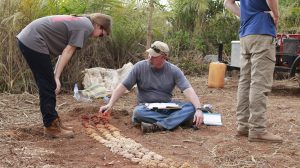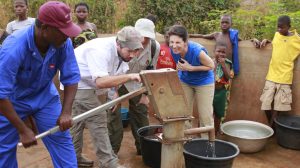
UM geology and geological engineering professor Bob Holt (seated) consults with graduate student Vera Gardner (standing, left) about soil samples during a 2016 Engineers Without Borders trip to Togo. Submitted photo
OXFORD, Miss. – Entering its sixth year of helping people of the West African nation of Togo build a sound infrastructure, the University of Mississippi chapter of Engineers Without Borders is continuing its work to help drill and complete a deep water well for a rural village.
Two faculty and six students are in the impoverished country through March 20, thanks to a successful crowdfunding campaign on Ignite Ole Miss last year. With help from more than 100 donors, the group surpassed its $20,000 goal for the effort.
The money enables members of EWB and School of Engineering faculty members to spend 18 days in Africa supervising the drilling of a well to provide clean water in the village of Akoumape. Rotary International is funding the project.
“Although the drilling project has been well planned, it may face some challenges,” said Cris Surbeck, associate professor of civil engineering and faculty adviser for Ole Miss-EWB. “Last year, there were equipment issues. There is also the uncertainty of what may be buried underneath the surface once the drilling is underway.”
This year’s team includes Robert Holt, professor of geology and geological engineering; Paul Scovazzo, associate professor of chemical engineering and construction guru; Vera Gardner, a senior in mechanical engineering from Memphis; Zack Lepchitz, a graduate student in geological engineering from Keswick, Virginia; Luc Rebillout, a graduate student in computational hydroscience from France; Zach Bray, a senior in geological engineering from Iuka; Karl Brandt, a senior in civil engineering from Beverly, Massachusetts; and Benton Schenck, a senior in geological engineering from Earlyville, Virginia.
“Dr. Scovazzo, the grad students and I are going over first to assist the drillers at the site for the well,” Holt said. “In addition to supervising the drilling and making field adjustments to the well design, we will be collecting geological samples, monitoring the drilling of the borehole and casing installation, and conducting a pumping test to determine the aquifer properties.”
The well will be between 270 and 300 meters deep when it is completed.
“When it will actually be finished is uncertain,” Holt said. “Parts break. Repairs take time. We never know exactly what will happen during a drilling operation until it happens.”
The well will provide drinking water to a children’s hospital, which is being built by a nonprofit organization. EWB-Ole Miss is committed to drill the well and consult on the building of two water towers, a distribution pipe and a public tap stand.

Togolese driver Sewa (left) pumps water from an existing well while UM EWB team members (from left) Zack Lepchitz, Paul Scovazzo and Cris Surbeck read the label on the pump during last year’s EWB trip. Submitted photo
“It’s going to be an expensive effort requiring professional construction crews and electricians,” Surbeck said. “Several Rotary Clubs in Mississippi and Tennessee raised more than $100,000 for this particular project’s expenses.”
The EWB-Ole Miss team made a long-term commitment in 2012 to work with rural villages in Togo to improve community infrastructure and health care. With five productive trips completed since that time, the EWB-Ole Miss team has built a school that provides a safe setting for dozens of children to learn and build better futures.
“All of these travelers, and countless other chapter members, have invested time, money and deeply committed efforts to see this project through to completion,” Surbeck said. “Faculty members donate all of their travel time without compensation.
“Participants are passionate about seeing this children’s hospital have clean water, which, in turn, will help health care workers care for sick children.”
The undergraduate students on this trip plan to write both a report for the national EWB organization and an article for publication in related academic journals, Holt said.